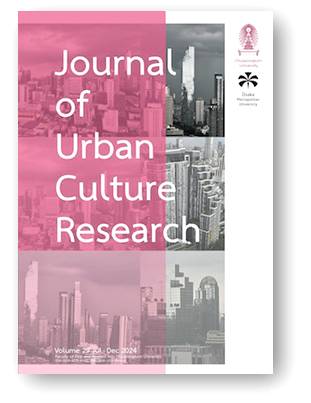Adaptive Reuse as a Tool for Sustainable Urban Development: The Case Study of Singapore, Southeast Asia
DOI:
https://doi.org/10.14456/jucr.2024.26Keywords:
Adaptive Reuse; Built Heritage; Sustainable Urban Development; Singapore; Southeast AsiaAbstract
This article aims to explore the application of adaptive reuse as a tool for urban built heritage management through the study of five cases in the city of Singapore, Southeast Asia. At the crossroads of urban strategy, building conservation and heritage management, the cases reveal the complexities of contemporary urban developments in one of the world’s leading cities. Five projects are analyzed and compared via thematic and content analysis, drawing from primary and secondary sources. The cases display the potential of adaptive reuse, as well as their connection to the larger context of sustainable urban (re)development, while offering a realistic overview of the possible difficulties associated with this process, such as gentrification and over-commercialization. Ultimately, the authors argue for adaptive reuse as a tool to be considered by built heritage managers and urban developers, as it may strike the right balance between different stakeholders and objectives.
Downloads
Published
How to Cite
Issue
Section
License

This work is licensed under a Creative Commons Attribution-NonCommercial-NoDerivatives 4.0 International License.
Authors authorize the JUCR to publish their materials both in print and online while retaining their full individual copyright. The copyright of JUCR volumes is retained by Chulalongkorn University.
The views and opinions expressed herein are those of the individual author(s) and do not necessarily reflect the policies or opinions of the Journal (JUCR), it editors and staff, Chulalongkorn University, or Osaka Metropolitan University.








